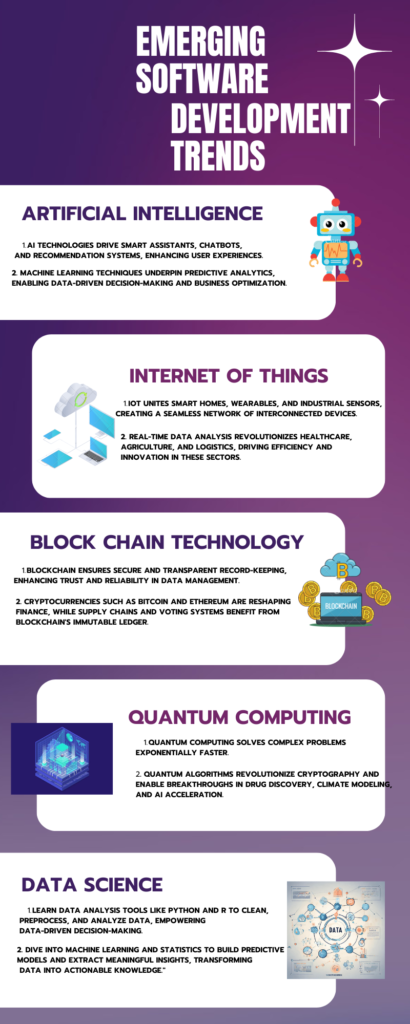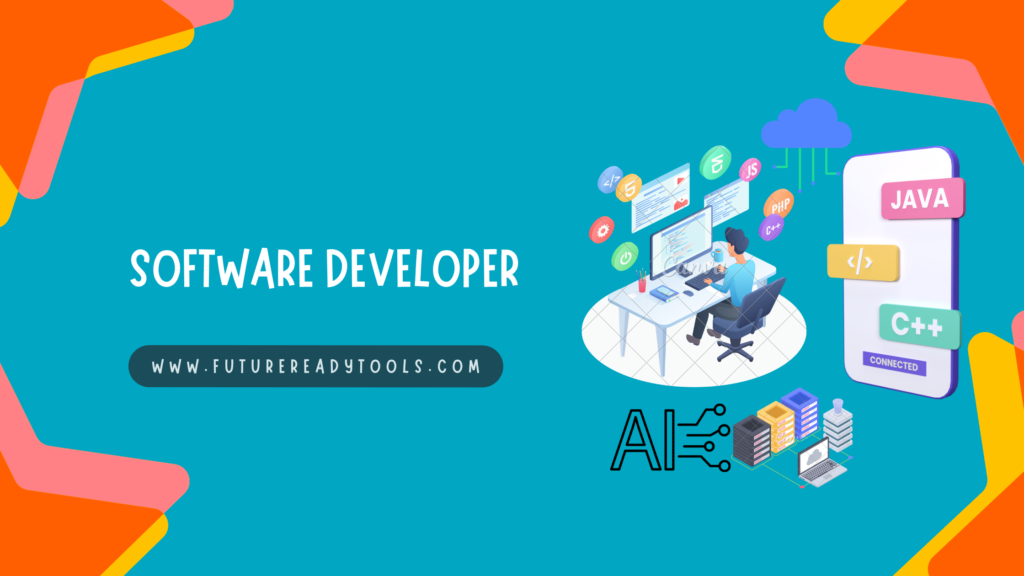Introduction
In today’s rapidly evolving job market, the quest for a Software Developer career is both intellectually stimulating and financially rewarding.
If you’re someone who revels in the art of problem-solving, the creative process of crafting applications, and the ever-changing world of technology, then the role of a software developer might just be your ideal destination.
In an age defined by relentless innovation and a ceaseless wave of digital transformation, the software developer’s profession emerges as a dynamic and pivotal force. Contrary to the common misconception that it revolves solely around lines of code, this profession is, in essence, about shaping the future.
The Architects of the Digital World
Imagine having the power to create software that runs everything from your smartphone apps to complex business systems. Software developers are the architects of the digital world, crafting the code that brings our ideas to life.
Software developers are the brains behind the software we use every day. They design, develop, and test software programs for various purposes, such as operating systems, web applications, mobile apps, games, etc. Software developers can work in different industries, such as IT, finance, education, entertainment, health care, and more.
Elevate Your Career to New Heights as a Software Developer

A career as a software developer offers limitless possibilities, allowing individuals to specialize in a wide array of fields such as web development, mobile apps, gaming, or any niche that piques their interest.
The choice is entirely theirs to make. If you’re ready to embrace the future, shape it, and bring your wildest tech dreams to life, a career as a software developer may be your perfect fit. By diving into the world of coding, you can unlock the door to endless opportunities. Your journey as a software developer is just beginning, and the future is yours to create.
Topics You Should Know:
1. Basic Programming Skills:
- Start with the fundamentals by learning a programming language like Python, JavaScript, or Java. Understanding these basics is crucial to your success as a software developer.
2. Computer Science Fundamentals:
- Dive into essential concepts such as algorithms, data structures, and computer architecture, which form the bedrock of software development.
3. Coding Platforms and Tools:
- Familiarize yourself with coding tools: Visual Studio Code, Git, and GitHub. They are indispensable for collaborative development.
4. Web Development:
- Learn about web technologies like HTML, CSS, and JavaScript, and delve into both front-end and back-end development to create dynamic web applications.
5. Mobile App Development:
- Explore the basics of mobile app development, focusing on platforms like iOS (using Swift) and Android (using Kotlin).
6. Database Management:
- Understand databases and learn the basics of SQL or NoSQL databases to handle data effectively in your applications.
7. Artificial Intelligence and Machine Learning:
- Gain knowledge about AI and ML in software development, and learn to use Python for machine learning to create intelligent applications.
8. Learn IoT Protocols:
- Familiarize yourself with IoT protocols like MQTT and CoAP, which facilitate device-to-device communication in the Internet of Things.
9. Hardware Knowledge:
- Acquire a basic understanding of hardware components, such as sensors, microcontrollers, and communication modules, crucial for IoT development.
10. Choose an IoT Platform:
- Explore popular IoT platforms like Arduino, and Raspberry Pi, or specific cloud providers like AWS IoT and Azure IoT to experiment and build innovative IoT projects.
11. Programming Languages:
- Learn programming languages like Python, C/C++, and JavaScript, which are commonly used for IoT development and are key to building connected systems.
12. Security Best Practices:
- Study IoT security best practices to safeguard devices and data from vulnerabilities, ensuring the safety and privacy of connected devices.
13. Cloud Computing:
- Introduce cloud platforms like AWS, Azure, and Google Cloud, and explain the benefits of cloud-based software development, which is integral to IoT applications.
14. Agile Development and DevOps:
- Discuss methodologies like Agile and DevOps, widely adopted in software development for efficient project management and collaboration.
15. Version Control and Collaboration:
- Teach how to work collaboratively using version control systems like Git and platforms like GitHub or GitLab, enabling teamwork and code version management.
- To learn more about other careers, check out our website https://futurereadytools.com/category/careers/
16. Collaborate and Innovate:
- Engage with IoT communities and collaborate on projects to gain practical experience, stay updated on the latest developments, and innovate in the IoT field.
The Internet of Things is a vast playground for software developers, offering numerous opportunities to create meaningful, innovative solutions. By connecting the physical world to the digital realm, software developers are at the forefront of a technological revolution, bringing convenience, efficiency, and intelligence to our lives.
As you embark on your IoT journey, remember that your code is the bridge that transforms our world into a more connected and intelligent place. Your skills are the key to unlocking a smarter future.
Coding Bootcamps: Software Developer’s Fast-Track to Tech Excellence
In the rapidly evolving landscape of technology, staying ahead of the curve is crucial. Enter coding boot camps, the innovative educational solution redefining how aspiring developers gain essential skills. In this article, we’ll explore the concept of coding bootcamps, what they entail, and the pros and cons of choosing this alternative to a traditional degree.
Coding boot camps offer a fast track to tech excellence, equipping individuals with the practical skills and knowledge needed to thrive in the dynamic world of software development.
What are Coding Bootcamps?
Coding boot camps are intensive, short-term programs designed to equip individuals with the practical coding skills needed to launch a successful career in the tech industry. These programs typically range from a few weeks to a few months, providing a fast-track route to proficiency in various programming languages, web development, data science, and more.
The Pros of Coding Bootcamps:
- Speed and Efficiency:
- Bootcamps are known for their swift pace. You can acquire in-demand skills in a matter of weeks, enabling you to enter the job market quickly.
- Practical Focus:
- Unlike traditional degrees, which can include a broad range of subjects, bootcamps are laser-focused on teaching practical, job-ready skills. You learn by doing, working on real-world projects from day one.
- Industry-Relevant Curriculum:
- Bootcamps adapt their curricula to match current industry demands. This means you’re learning the latest technologies and trends directly applicable to your desired job.
- Mentorship and Support:
- Many boot camps offer mentorship and support, providing you with guidance from experienced professionals who have been in the industry.
- Networking Opportunities:
- Bootcamps often have strong connections with tech companies, facilitating networking and job placement after completing the program.
- Cost-Effective:
- Bootcamps are generally more budget-friendly than traditional degrees. You don’t have to commit to several years of tuition fees and textbooks.
The Cons of Coding Bootcamps:
- Intense Learning Curve:
- The fast pace of boot camps can be challenging. You’ll need to dedicate a significant amount of time and effort during the program.
- Narrow Focus:
- While boot camps offer in-depth training in specific areas, they may lack the broad knowledge base that comes with a traditional degree.
- Limited Theoretical Understanding:
- Bootcamps prioritize practical skills, which means you may not receive as much theoretical education or background knowledge as you would with a degree.
- Job Placement Not Guaranteed:
- While many boot camps boast high job placement rates, there’s no guarantee of securing a job immediately after completing the program. Success often depends on various factors, including the job market and your dedication.
- Less Comprehensive:
- If you’re looking for a well-rounded education or want to specialize in niche areas, boot camps may not provide the depth and breadth you desire.
Coding Bootcamp links
Here are some links to coding boot camps:
- Free coding boot camps:
- freeCodeCamp: https://www.freecodecamp.org/
- The Odin Project: https://www.theodinproject.com/
- Codecademy: https://www.codecademy.com/
- Skillcrush: https://www.skillcrush.com/
- Paid online coding boot camps:
- General Assembly: https://generalassemb.ly/
- Flatiron School: https://www.flatironschool.com/
- Springboard: https://www.springboard.com/
- Udacity: https://www.udacity.com/
- In-person coding boot camps:
- Coding Dojo: https://www.codingdojo.com/
- Hack Reactor: https://www.hackreactor.com/
- App Academy: https://www.appacademy.io/
- Galvanize: https://www.galvanize.com/
Please note that this is just a small sample of the many coding boot camps available. There are many other great programs out there, so it is important to do your research and find one that is right for you.
Here are some tips for choosing a coding bootcamp:
- Look for a program with a good reputation. Read reviews from former students and employers to learn about the quality of the program.
- Make sure the curriculum covers the skills you want to learn. Coding boot camps offer a variety of different programs, so choose one that focuses on the skills you are most interested in.
- Consider the program’s job placement rate. Many coding boot camps offer job placement assistance to their graduates. Find a program with a good track record of helping students find jobs.
Soft skills required as a Software Developer
In addition to mastering multiple programming languages, when you commence your journey within an organization, it becomes paramount to nurture your soft skills and strive for self-improvement, striving to be the best version of yourself.
Here are some of the most important soft skills for software developers:
- Communication: Software developers need to be able to communicate effectively with a variety of stakeholders, including other developers, project managers, and clients. They need to be able to clearly explain complex technical concepts in a way that is easy to understand.
- Collaboration: Software development is a team sport. Developers need to be able to work effectively with other developers to build and maintain complex software systems. They need to be able to share ideas, give and receive feedback, and resolve conflict.
- Problem-solving: Software developers are constantly faced with challenges and problems. They need to be able to think critically and creatively to find solutions.
- Adaptability: The software development landscape is constantly changing. Developers need to be able to adapt to new technologies, trends, and requirements.
- Empathy: Software developers need to be able to understand the needs of their users and stakeholders. This requires empathy and a willingness to listen to others.
Other important soft skills for software developers include:
- Attention to detail.
- Organization
- Time management
- Self-motivation
- Patience
- Work ethic
Software developers who have strong soft skills are more likely to be successful in their careers. They are better able to collaborate with others, solve problems, and adapt to change. They are also better able to understand the needs of their users and stakeholders.
If you are interested in a career in software development, it is important to develop your soft skills as well as your technical skills. There are many ways to do this, such as taking classes, reading books, and participating in online communities. You can also practice your soft skills in your everyday life by volunteering, joining clubs, and working on team projects.
Key Takeaways
The job outlook for software developers is also very positive, with a projected growth of 22% from 2019 to 2029, much faster than the average for all occupations.
Becoming a software developer is not easy, but it is definitely rewarding. You will be able to create software that can make a difference in the world and improve people’s lives. You will also have the opportunity to learn new skills and technologies and grow your career. If you are passionate about software development and ready for a challenge, this might be the career for you.
There is no one-size-fits-all answer. The decision between formal education and self-learning depends on your personal preferences, career goals, and circumstances.
Many successful software developers have taken both paths, underscoring that success ultimately hinges on dedication, passion, and a willingness to continually adapt and learn.
Regardless of your choice, the world of software development is ripe with opportunities, and the wealth of online resources ensures that self-learners have access to valuable knowledge.
Ultimately, the path you choose is a stepping stone to a fulfilling career in software development, where your passion and proficiency will set you apart.





